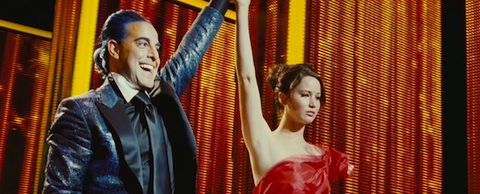 Katniss, a girl who finds herself in the forest, who had her childhood taken long before the reaping and throws herself on the sacrificial block for the desperate love of her sister becomes the celebratory commodity of the 74th Hunger Games. She is thrust into the limelight and a circus of publicity that is a masterful mix of sentimentality and terrible exploitation (Alleva).
Katniss, a girl who finds herself in the forest, who had her childhood taken long before the reaping and throws herself on the sacrificial block for the desperate love of her sister becomes the celebratory commodity of the 74th Hunger Games. She is thrust into the limelight and a circus of publicity that is a masterful mix of sentimentality and terrible exploitation (Alleva).
Children are not able to embrace their identity as we would perceive children to be able to do. They are the possible saviours of their families, waiting for the reaping, adding their names to the lottery for the benefit of feeding their families. Katniss is different. She is set apart from her peers because of the time she spent with her father in the forrest. The knowledge and tools gained from her father transforms into the role of protector and provider of her family after her father is lost. She makes the sacrifices necessary for the survival of her family. Her behaviour at the reaping is not surprising. Her rebellious nature has been natural to her identity:
When I was younger, I scared my mother to death, the things I would blurt out about District 12, about the people who rule our country, Panem, from the far-off city called the Capitol. Eventually I understood this would only lead us to more trouble. So I learned to hold my tongue and to turn my features into an indifferent mask so that no one could ever read my thoughts. (6)
It is this rebellion that lives within her that makes Katniss different from the other Tributes, different from the other children. It is here that there is a spark that can be ignited to connect others, to show them that change is coming and fire is spreading. Peeta, who is more aware of how to play the game the Capitol expects them to play is always trying to protect Katniss, in her stubbornness, and lack of education of how the colonization has made the rules and why they must first conform to them . She is, however aware of the gaze.
I’ve been right not to cry. The station is swarming with reporters with their insect like cameras trained directly on my face. But I’ve had a lot of practice at wiping my face clean of emotions and I do this now. I catch a glimpse of myself on the television screen on the wall that’s airing my arrival live and feel gratified that I appear almost bored. (40)
It is Katniss’ father who first gave her identity, as he told her, ‘as long as you can find yourself, you’ll never starve’, which is meant to be literal, referring to the plant she was named for, but it also speaks to Katniss’ ability to know herself, to lean on that which provides her with an identity, a tool that others lack because of the way in which they are forced to live. It is this ability to stand out that Katniss can use the celebrity that is thrust upon her to motivate an entire body of people who are ready for change but stripped of the ability to seek it out. This gives Katniss a tremendous amount of power. This is power that the Capitol, especially the game makers and President Snow does not want her to have. She is using their game and using their tactics against them. She is aware that she is watched, that she is broadcast and she has practice of self editing and understands the ability she has to control what others see. It is this new power that draws others to her.
Katniss is aware that there is a division between what she is on the stage and what she is in the arena. She is aware that there is a shift in her power. She can be presented as a captivating figure, one to be admired, but that is changed and stripped in the arena as she becomes a source of entertainment because of the body that controls the video feed (Ming Tan). She must simultaneously be seen as worthy of love and desire in order to attract sponsors and young and harmless in order to avoid the wrath of the Capitol, both identities juxtaposed to reflect a real need of survival.
As she tries to defy the Capitol as she decorates Rue in her own show of a funeral, Katniss realizes that the power still lays with the Capitol and with their ability to edit the images as they see fit. They will not be able to ignore the image of Rue’s body being removed from the arena, but they need not show those watching the ritual Katniss performs. Her next opportunity for defiance is one that Capital cannot ignore, “Both she and Peeta play to the audience and outwit Snow by threatening to swallow poisoned berries. Katniss’s memories of her family and her father punctuate her time in the arena and contributee to her growing sense of social and personal justice” (Muller).
………………………………………………………………………
The need for an understanding of humanity, especially a humanity that exists beyond what we immediately recognize as such is just as important as the questioning of the ‘reality’ that the media we consume today is delivering to us. As Katniss arrives in the Capitol there is a disconnect between her and her prep team – neither immediately seeing the other as ‘human.
The Capitol prep team on Katniss: “The three step back and admire their work. Excellent! You almost look like a human being now! says Flavious, and they all laugh” (62).
Katniss on her prep team: “I know I should be embarrassed, but they’re so unlike people that I’m no more self-conscious that if a trio of oddly coloured birds were pecking around my feet” (62).
This divide is part of what allows the horror of The Games to continue. The people don’t view the tributes as they are, people – to be valued and honoured and protected. As those from the Capitol vacation in old arenas, reliving the entertainment and becoming part of the action, consuming the atrocities into their real lives, so will we, as plans to develop a Hunger Games theme park more forward. And this, in the name of profit. In the book, it was in the name of power, in today’s society profit and power are synonymous.
………………………………………………………………………
Katniss will never have the ability to be whole, as she has been part of a society that sends its children off to their deaths. She has the ability, however to heal, as she provides the catalyst, the spark, the inspiration to change. She is saved through the entire narrative of moral depravity. The premise of the Games, and the way the winner wins, decides that the victor is a killer. It is no stretch to believe they are ruthless, survivalists and strong. Katniss’ journey in the Games does not depict her as such. The audience is not forced to feel ethical question with any of the kills Katniss is responsible for. As she drops the wasp nest on the band of assassins below her, we struggle to feel anything beyond relief for those who perish. As she takes down the boy who slays Rue with the arrow, we are proud of her for defending her ally. As she kills Cato, she takes pity on him and rather, ends his suffering. How could she have ever killed Thresh? – as he spared her and came from the District that embraced her with the gift of bread following Rue’s death. Or Foxface? – who was scared and alone and just a scavenger. She was excused of all of these acts. We are all spared the questions that would have come if we had been paired with a girl who could kill people as she killed animals. We are excused because of the horror that the Games and the Capitol inflict upon themselves, with the oppression, with the surveillance, with the want for visual violence.
………………………………………………………………………
The captivating nature of Katniss is seen first in both Peeta and Haymitch. Peeta understands how to present her and Haymitch knows how to employ the manipulation. They see this power in a different way than Katniss who is operating in desperation and strictly with her survival instincts, we must, as she must, see Katniss through the eyes of others. It is Peeta who aids in this elevation of her as a commodity, with their relationship, now as a thing to be emulated, fawned over, consumed, as Peeta can be genuine and authentic as the cameras roll on – he has more faith in Katniss than he does in himself (a sad fact that he mirrors from his own mother) and Haymitch understands the shallowness, the material nature and the way to the pockets and the favour of the sponsors. Katniss does not merely elevate herself, she is working with a team who sees something in her and pushes her to fulfill her legacy as leader of a much needed rebellion.
And we are captured, just like the fictional audience, by the trope of the YA genre, the underlying love story, the quiet relationship between two seemingly star-crossed youths. It’s what makes us devote ourselves to these characters, what excites the Capitol, what distracts Snow and what gathers the momentum needed to capture enough of the moment to change the course of history for the Districts that have suffered too long.
SOURCES USED IN POST
Alleva, Richard. Sentimentalized Barbarity: The Hunger Games. Link. April 23, 2012
Brown, Adam and Tony Chalkley. “Beautiful, Unethical, Dangerous: Screening Surveillance and Maintaining Insecurities”. Reconstruction: Studies in Contemporary Culture. Link
Collins, Suzanne. The Hunger Games. Scholastic Press, New York. 2008
ISBN-13: 978-0-439-02352-8
Ming Tan, Susan Shau. “Burn with us: Sacrificing Childhood in The Hunger Games.” The Lion and the Unicorn 37.1 (2013): 54-73
Muller, Vivienne. “Virtually Real: Suzanne Collins’s the Hunger Games Trilogy. Link
